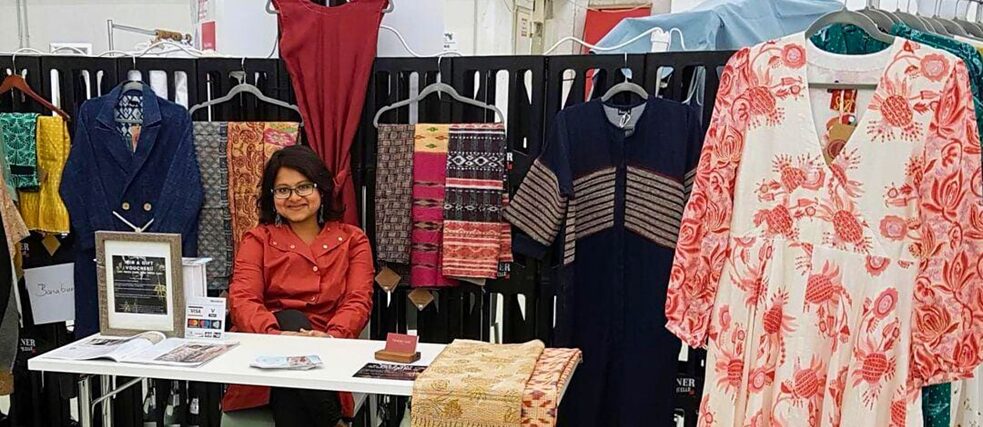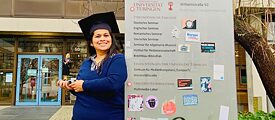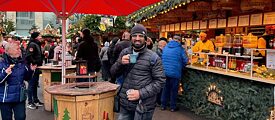Paushali Lass
Age: 46 years
Origin: New Delhi, India
Location in Germany: Düsseldorf
Profession: Culinary and Social Entrepreneur
Paushali's Life in Germany
Food entrepreneur, sustainable textile business owner, published author, and a polyglot – Düsseldorf resident Paushali Lass wears multiple identities on her sleeves. A mother of five and a self-starter with a business background, she works with numerous NGOs supporting different causes from India to Turkey and Israel. Originally from Calcutta, Paushali grew up in New Delhi and made Germany her home two decades ago.
Her initial ride was hardly smooth when she moved to Münster in early 2004 as a newly married, full of nervous excitement to get to know the country up close and personal. “It was initially hard in the sense that the German culture is very different from many other cultures. I moved from Scotland, which is an extremely friendly country. But in Germany, people are more direct. You get into the bus and the drivers don’t smile. I was used to smiling bus drivers in Scotland.,” Lass recalls the memory over laughter.
Although she started appreciating the directness and honesty, Paushali confesses to being confused in the beginning. “You tend to think, why are people so rude? They don’t mean to be rude, that’s just the way they are. When people get to know you personally, they become close friends, but you get to that point to overcome this initial feeling,” she adds.
Once the initial hiccups of unfamiliarity settled down, Paushali threw herself into learning German. “I knew that I had no choice because I was going to live here. Funnily enough, I didn’t take a course. I was thrown into the situation where I had to learn, and I still believe that is the best way to learn a language,” she says.
How did she learn the language without professional help? Paushali, who can speak Italian and a smattering of Greek, Portuguese, Turkish, Arabic, Hebrew other than Hindi and Bengali, says she learnt to speak by practice. She says, “Since all our friends were German, the process was just by hearing, being forced to speak, trying to learn new words and improving our vocabulary. People were very patient and kind with me. They gently let me know if I made mistakes and so I had the courage to make mistakes.”
Now two decades later, Paushali’s most fluent languages are English and German. Despite having mastered conversational German, Paushali says certain aspects of daily life in Germany took time to adapt. “Once I started having kids, I felt like the only one who is always like an outsider because I haven’t grown up in the German system. But it didn’t matter because I started to love and appreciate living in Germany quickly because I love the way things are organised here,” she confesses.
A perfect opportunity to bridge these cultural differences arose in the form of food entrepreneurship. In the middle of the pandemic, she sold out the entire stock of her artisanal sustainable fashion business after the local broadcaster WDR2 did a segment on her. Since she couldn’t source new stock anymore because of Covid restrictions, Paushali, fuelled by the burning desire to introduce Indian food the way she grew up eating, started giving cooking classes. Her friend, whose restaurant was closed because of lockdown, allowed the use of her kitchen from where she started doing takeaways that quickly became popular.
"Food is an important part of my life, when I was in my twenties, I found the adventure of living in Europe very exciting. When I moved to Germany, I didn’t miss India much except for the food, which is just the best. As I grew older, I realise I miss the culture I come from, food was one of the ways of staying connected with the culture,” she reasons.
Paushali uses food as a way to connect with Indian culture, in addition to making people realise Indian food is way beyond naan and butter chicken. “I was trying to contribute a little to the conversation to show people through food as to how diverse India is. That’s also in a way for me to remain connected with India while living in Germany.” Though she makes a wide range of Indian food, her specialities in the kitchen include Kosho Mongsho, Luchchi and Aloor Dum.
Of the many things she appreciates the way the German society is organised, Paushali claims that the hierarchical nature of German workplaces reminded her of India. “ I didn’t have to be frustrated with punctuality like in Delhi,” she says. “Everything works like clockwork and work wise it’s a better work culture.”
Paushali, who is in a unique situation because she has been a German citizen for so long says she has become a German in so many ways. “I do understand the nitty-gritty of being a German because I am so deeply integrated into it and a part of my family is German. You have moments when you feel like you belong here, and sometimes, the other side of it is true too.”
Even as she straddles between two worlds as a well-adapted first-generation Indian German, when she is free of familial responsibilities, Düsseldorf keeps her on her toes. “I know many restaurants and chefs in Düsseldorf, I love eating out. I like visiting museums and I go for a run or a walk. I take art classes once a week with friends, just to be able to forget about everything else and create something on canvas. Düsseldorf has a lot to offer that way. It’s a compact, international city,” she concludes.
Her initial ride was hardly smooth when she moved to Münster in early 2004 as a newly married, full of nervous excitement to get to know the country up close and personal. “It was initially hard in the sense that the German culture is very different from many other cultures. I moved from Scotland, which is an extremely friendly country. But in Germany, people are more direct. You get into the bus and the drivers don’t smile. I was used to smiling bus drivers in Scotland.,” Lass recalls the memory over laughter.
Paushali used to run an artisanal sustainable clothing business in Düsseldorf.
Although she started appreciating the directness and honesty, Paushali confesses to being confused in the beginning. “You tend to think, why are people so rude? They don’t mean to be rude, that’s just the way they are. When people get to know you personally, they become close friends, but you get to that point to overcome this initial feeling,” she adds.
Once the initial hiccups of unfamiliarity settled down, Paushali threw herself into learning German. “I knew that I had no choice because I was going to live here. Funnily enough, I didn’t take a course. I was thrown into the situation where I had to learn, and I still believe that is the best way to learn a language,” she says.
German by practice
Paushali with women of the GründerMütter Network and ex Minister Franziska Giffey
How did she learn the language without professional help? Paushali, who can speak Italian and a smattering of Greek, Portuguese, Turkish, Arabic, Hebrew other than Hindi and Bengali, says she learnt to speak by practice. She says, “Since all our friends were German, the process was just by hearing, being forced to speak, trying to learn new words and improving our vocabulary. People were very patient and kind with me. They gently let me know if I made mistakes and so I had the courage to make mistakes.”
Now two decades later, Paushali’s most fluent languages are English and German. Despite having mastered conversational German, Paushali says certain aspects of daily life in Germany took time to adapt. “Once I started having kids, I felt like the only one who is always like an outsider because I haven’t grown up in the German system. But it didn’t matter because I started to love and appreciate living in Germany quickly because I love the way things are organised here,” she confesses.
I do understand the nitty-gritty of being a German because I am so deeply integrated into it and a part of my family is German.
Paushali Lass
Connecting people via food
Paushali at her Mustard Table cooking class event.
"Food is an important part of my life, when I was in my twenties, I found the adventure of living in Europe very exciting. When I moved to Germany, I didn’t miss India much except for the food, which is just the best. As I grew older, I realise I miss the culture I come from, food was one of the ways of staying connected with the culture,” she reasons.
Paushali uses food as a way to connect with Indian culture, in addition to making people realise Indian food is way beyond naan and butter chicken. “I was trying to contribute a little to the conversation to show people through food as to how diverse India is. That’s also in a way for me to remain connected with India while living in Germany.” Though she makes a wide range of Indian food, her specialities in the kitchen include Kosho Mongsho, Luchchi and Aloor Dum.
Of the many things she appreciates the way the German society is organised, Paushali claims that the hierarchical nature of German workplaces reminded her of India. “ I didn’t have to be frustrated with punctuality like in Delhi,” she says. “Everything works like clockwork and work wise it’s a better work culture.”
Paushali, who is in a unique situation because she has been a German citizen for so long says she has become a German in so many ways. “I do understand the nitty-gritty of being a German because I am so deeply integrated into it and a part of my family is German. You have moments when you feel like you belong here, and sometimes, the other side of it is true too.”
Even as she straddles between two worlds as a well-adapted first-generation Indian German, when she is free of familial responsibilities, Düsseldorf keeps her on her toes. “I know many restaurants and chefs in Düsseldorf, I love eating out. I like visiting museums and I go for a run or a walk. I take art classes once a week with friends, just to be able to forget about everything else and create something on canvas. Düsseldorf has a lot to offer that way. It’s a compact, international city,” she concludes.
Rapid Fire with Paushali
What is your advice for people who want to move to Germany for work/studies?
Come with an open mind. People can be quite direct and hence appear rude, but they don’t always mean it. It’s a beautiful country and not many people are aware of that. People just think of Germany as a technically advanced country, but it boasts numerous breathtaking landscapes. Additionally, it serves as a perfect gateway for exploring different parts of Europe.
Have you learnt any valuable lessons during your time in Germany?
Start learning German from day 1. Get over the shyness of speaking, people really appreciate it when you speak the language. Germans are really very open to foreigners so try to integrate into the culture.
Name your favourite words in German!
There are so many words that only make sense in German. My favourites are Egal & Jein.
Come with an open mind. People can be quite direct and hence appear rude, but they don’t always mean it. It’s a beautiful country and not many people are aware of that. People just think of Germany as a technically advanced country, but it boasts numerous breathtaking landscapes. Additionally, it serves as a perfect gateway for exploring different parts of Europe.
Have you learnt any valuable lessons during your time in Germany?
Start learning German from day 1. Get over the shyness of speaking, people really appreciate it when you speak the language. Germans are really very open to foreigners so try to integrate into the culture.
Name your favourite words in German!
There are so many words that only make sense in German. My favourites are Egal & Jein.







